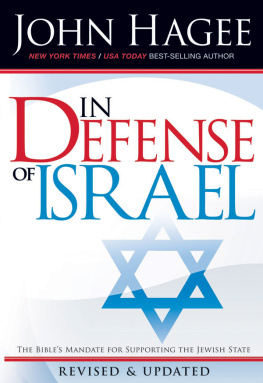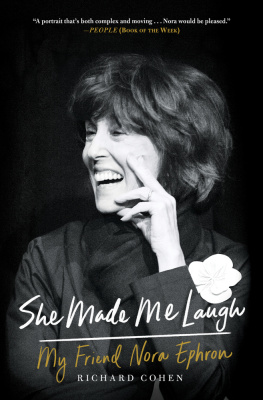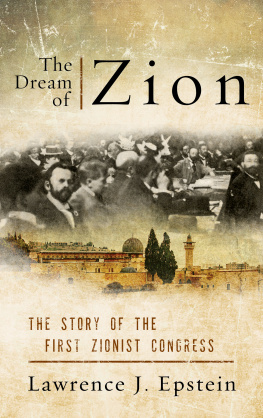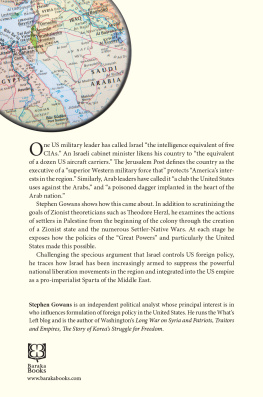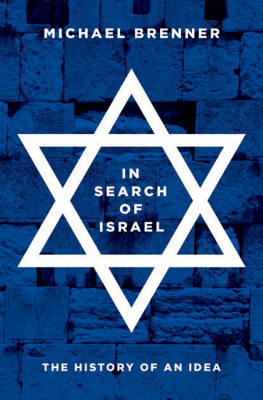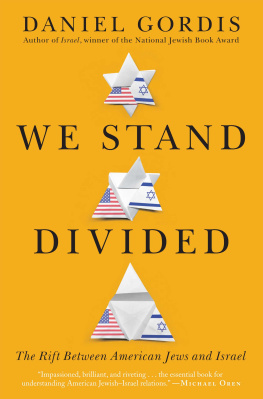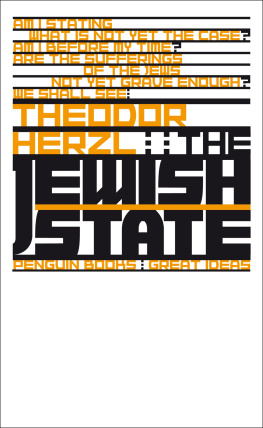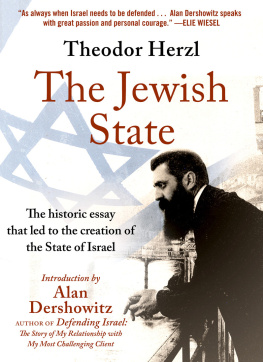IN THE SHADOW OF ZION
In the Shadow of Zion
Promised Lands before Israel
Adam Rovner

New York and London
NEW YORK UNIVERSITY PRESS
New York and London
www.nyupress.org
2014 by New York University
All rights reserved
References to Internet websites (URLs) were accurate at the time of writing. Neither the author nor New York University Press is responsible for URLs that may have expired or changed since the manuscript was prepared.
LIBRARY OF CONGRESS CATALOGING-IN-PUBLICATION DATA
Rovner, Adam, 1970- author.
In the shadow of Zion : promised lands before Israel / Adam Rovner.
pages cm
Includes bibliographical references and index.
ISBN 978-1-4798-1748-1 (hardback)
1. Jewish diaspora--History--19th century. 2. Jewish diaspora--History--20th century. 3. Jews--Migrations. 4. Jews--History. 5. Jews--Identity. 6. Zionism--Influence. I. Title.
DS134.R68 2014
909.049240821--dc23
2014024562
New York University Press books are printed on acid-free paper, and their binding materials are chosen for strength and durability. We strive to use environmentally responsible suppliers and materials to the greatest extent possible in publishing our books.
Manufactured in the United States of America
10 9 8 7 6 5 4 3 2 1
Also available as an ebook
these extrapolations of territory
are published with an assist from
Jewish Federation of Greater Hartford
In memory of my grandfather, Harvey Rovner zl, and in honor of my grandmother, Felice Rovner. They told me stories and taught me to be at home in this world, while always trying to make it a little bit better.
And, as imagination bodies forth
The forms of things unknown, the poets pen
Turns them to shapes, and gives to airy nothing
A local habitation and a name.
A Midsummer Nights Dream 5.1

CONTENTS
PREFACE
Land, Land!This is the secret to the solution of the Jewish question.
Nathan Birnbaum, Die Nationale Wiedergeburt des jdischen Volkes in seinem Lande (1893)
For generations, Jews and Christians, authors and adventurers, politicians and revolutionaries all sought a territorial solution to the problem of Jewish homelessness. Their searches for a homeland took them beyond the borders of the biblical land of Israel and across the globe to every continent except Antarctica. I have followed in their footsteps to examine first-hand the precise locations of each of these lost visions of Jewish autonomy. Today this little-known history has led me to Angolas second-largest city, Huambo.
Its early morning and the cool air carries the scent of smoke from hundreds of open-air fires. Potholes that could twist a cars axle crater the city streets. Open sewers edge the sidewalks. The faades of most buildings are pocked with bullet holes from Angolas decades-long civil war. Some structures reveal the tell-tale scars of mortar shells: twisted rebar snaking from jagged gashes in concrete walls. A boy, probably not more than ten years old, raises his deformed arms up to me from the pavement. Where his hands should be I see only knuckled humps of scaly-shiny skin. Probably leprosy. You cant travel far in this country without seeing someone on crutches, a pant leg hanging limply beneath the knee. There are millions of land mines buried beneath the countrys soil, but leprosy is a new horror to behold. I recoil. So too does my close friend, Michael Kollins. In addition to taking many of the photographs for this book, Mike has tirelessly helped me track down archival sources and once, during a research trip in South America, he came to my rescue after a wild dog sunk its teeth into my leg and pulled me to the ground. Why are we in Angola again? he asks.
Were here because a century ago a scientific expedition arrived in the frontier outpost of Huambo to determine whether this region of the Benguela Plateau could be developed into a Jewish state. Angolas master at the time, Portugal, had provisionally approved the plan. The colonial press supported the project. So too did several important Jewish leaders. Yet Angola forever remained a paper state.
Between roughly 1820 and 1948, intellectuals advanced numerous proposals aimed at carving out Jewish territories in remote and often hostile locations. The would-be founding fathers of these imaginary Zions dispatched survey teams to far-flung locales and filed reports on the states they planned to establish. Instead of exporting Jaffa oranges, citizens of these unrealized Israels might have shipped pineapples from the Amazon Basin, stalked lions in East Africa, or hunted whales off the Tasmanian coast. Rather than sweltering under the Mediterranean sun, they might have endured tropical downpours in Madagascar, or felt the chill of the Angolan highlands. The Jewish state might even have been one of the United States.
This book tells the true stories of these fantastic Jewish geographies and the men and women who proposed them. These individuals risked public ridicule, assassination, personal betrayal, financial hardship, the physical dangers posed by a pitiless natural world, and an equally unforgiving political climate. At stake was nothing less than the salvation of European and Russian Jewry. They failed in their rescue efforts, and because they failed, their dreams and schemes have mostly been forgotten. Until now.
Introduction
They Say There Is a Land...
Victors and Vanquished
The great Hebrew poet and translator Shaul Tchernichovsky sat aboard an electric tram as it rattled through Berlins busy streets in 1923. Overhead the wires sent a hum through the crowded car. He stared out the window at the cityscape and smoothed his walrus moustache with his fingers. A child of the countryside, Tchernichovsky first gained renown as a Romantic poet of the natural world. While industrialized Weimar Berlin flickered past him, he was shot through with a longing for another place, for another landscape. Inspiration creased the authors brow and he cast a wild-eyed glance from right to left looking for a scrap of paper. None could be found. His gaze then fell upon the white cuffs of his shirt. He gripped his fountain pen and began to scrawl the words to a new poem on the starched fabric. That smeared verse born in a moments passion was destined to become one of Tchernichovskys most famous poems, and also one of his most vexing.
Handsome, barrel-chested, and with a wavy mane of hair, Tchernichovsky was nearly fifty in 1923. He had endured the early twentieth centurys upheavals, serving as a medic in World War I and witnessing the Bolshevik Revolution. Tchernichovsky was also a committed Zionist who wrote in praise of Jewish national rebirth. For years he had wandered from place to place, from his native Ukraine across Russia, to Switzerland, to Turkey, and onward to Germany even as Eretz Israel always beckoned, but Tchernichovsky was frustrated by his efforts to secure a position in the one home he desired. And so he literally wore his hearts desire on his sleeve in the form of the verse to which he gave birth aboard a tram more than eighty years ago.
The resulting eight-stanza poem, They Say: There Is a Land, reveals the depths of his distress. The final three stanzas read:
Already
We have crossed
Many deserts and seas,
Next page


